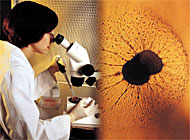Swiss science celebrates half a century

The National Science Foundation has helped to make Switzerland a world leader in basic research, but there are fears that it risks losing that edge.
Its priorities remain the funding of independent basic research and the fostering of young scientific talent.
However, the world of science has changed dramatically since the foundation was set up on August 1, 1952.
And Switzerland is fighting to maintain its strong research base in the face of financial constraints.
Success story
“If you look at the position of Switzerland in the area of basic research, I think it is fair to say that we are doing very well,” said secretary-general, Hans Peter Hertig.
“You can always do better. Maybe we should have worked harder in the past ten years in trying to attract young, brilliant people into these fields.”
Scientists supported by the foundation include Nobel prize winners such as Rolf Zinkernagel (medicine, 1996), Richard Ernst (chemistry, 1991) and Werner Arber (medicine, 1978).
However, Hertig says individual success stories should be seen in the wider context of basic research.
“We are not talking about a field where you have quick and, at first sight, directly useful results,” he told swissinfo. “What we are trying to do is foster a broad scientific community with young, brilliant people.
“Seventy-five per cent of our money goes to young scientists between the ages of 20 and 35. We are not looking for quick results.”
Emerging trends
One important trend in recent years is the significant increase in interdisciplinary research projects.
“More and more interesting things are happening between the disciplines,” said Hertig. “This is a challenge for a foundation like ours because we mirror what’s happening in our universities.
“The sciences are still structured in an old-fashioned way and so, along with the universities, we have to try to bring down the old barriers among the disciplines.”
Hertig believes a big shake-up in the organisation of science funding is also on the cards.
“The organisation of science funding is going to become even more international. Doing things bilaterally with agreements between two funding organisations belongs to the past.
“The future belongs to more flexible, ad hoc cooperation where the best in the world put their strengths together and try to come up with new results.”
Promoting research
This year, the foundation is funding some 3,000 research projects from its budget of SFr400 million.
About 80 per cent of the resources are allocated to independent research and 20 per cent to research programmes.
About 20 per cent is allocated to the social sciences and humanities while the rest is split almost evenly between the natural and engineering sciences and the life sciences.
“Generally in Switzerland we have neglected the social sciences and the humanities so these certainly need a push,” said Hertig.
Trouble ahead
Before Switzerland inaugurated a national institution to promote science, universities and institutes were entirely the responsibility of their home cantons whose research budgets were very limited.
The system established 50 years ago has made a Switzerland a world leader in basic research.
However the scientific community believes that Switzerland has lost considerable ground over the last decade and unless there is a substantial increase in investment, it will lose its competitive edge.
On Monday, the foundation appealed for a budget increase of more than 80 per cent between now and 2007 saying an extra SFr1.25 billion was needed if basic research in Switzerland was to remain among the best in the world.
by Vincent Landon

In compliance with the JTI standards
More: SWI swissinfo.ch certified by the Journalism Trust Initiative
You can find an overview of ongoing debates with our journalists here . Please join us!
If you want to start a conversation about a topic raised in this article or want to report factual errors, email us at english@swissinfo.ch.